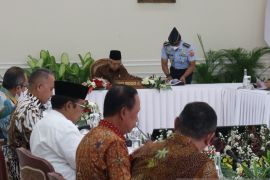Hence, she reminded that fiscal tools should continue to be developed to fill the gap and ensure that the economy will run on productivity and innovation.
"For this matter, Indonesia spends 20 percent of its state budget for education," Mulyani remarked at the 2023 Indonesia-Europe Investment Summit in Jakarta on Thursday.
She noted that this year's state budget allocated Rp608.3 trillion ($39.15 billion), or 20 percent, for education. This allocation includes Rp233.9 trillion ($15.05 billion) in central government spending, Rp305 trillion ($19.64 billion) for transfers to regions, and Rp69.5 trillion ($4.47 billion) in education endowment funds.
Mulyani pointed out that knowledge gap in the country was caused by a demographic bonus, with people having no proper knowledge and abilities.
This was caused by majority of the workforce in Indonesia constituting elementary school graduates, reaching 52.84 million, or the equivalent of 35.78 percent of the total workforce, she explained.
Related news: State spending supports acceleration of green economy transformation
Furthermore, the largest workforce is filled by high school graduates, with 30.84 million, or 20.88 percent; junior high school, 26.1 million, or 17.67 percent; and vocational high schools, 19.11 million, or 12.94 percent, Mulyani remarked.
This was followed by bachelor's degree holders, master's degree holders, and doctoral graduates, 15.23 million, and undergraduates, 3.58 million.
"The workforce is still relatively young, which should be positive, but the younger generation is uneducated and lacks knowledge, and that is a problem," she stated.
Hence, Mulyani will pay greater attention to filling the knowledge and skills gaps in the Indonesian workforce.
Apart from fiscal policy, Mulyani remarked that the education policy should be improved, including link and match in vocational education.
In future, the adoption of technology and various core abilities, such as creative thinking and analytical thinking, will be needed by the workforce, she stressed.
Related news: Indonesia raises $1.4 bln from retail green sukuk for climate projects
Translator: Agatha Olivia V, Resinta Sulistiyandari
Editor: Jafar M Sidik
Copyright © ANTARA 2023











